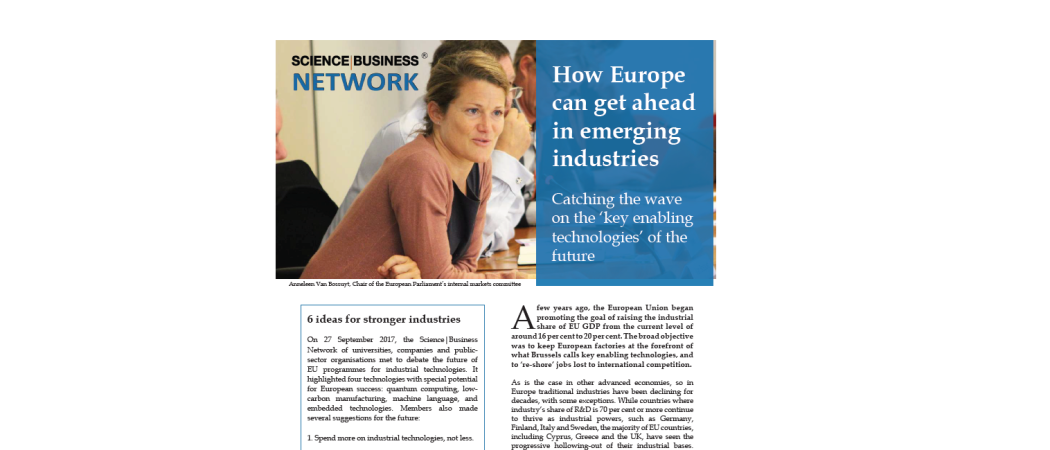The Science|Business Network picks fields where European companies and research bodies can catch the innovation wave, and suggests ways the EU can ensure this happens

Download the full report here
The coming wave of industrial revolution is being built on advances in artificial intelligence, robotics, virtual reality, semiconductors, photonics, nanotech, biotech, neurotech and a variety of other fields.
Is European industry ready to catch these waves? This was the question debated at a meeting of the Science|Business Network in Brussels on 27 September 2017.
The diagnosis, presented today in a new report, is mixed. As in other advanced economies, in Europe traditional industries have been declining for decades, with some exceptions. While countries where industry’s share of R&D is 70 per cent or more continue to thrive as industrial powers, such as Germany, Finland, Italy and Sweden, the majority of EU countries, including Cyprus, Greece and the UK, have seen the progressive hollowing-out of their industrial bases.
However, at least four areas, in particular, have special potential for European leadership – quantum computing, low-carbon manufacturing, machine language, and embedded technologies – and would benefit from additional EU support.
In quantum computing, there’s the promise of serious investment from Brussels: a year ago, the EU Commission announced that it would create a €1 billion research effort in the field. Despite the positive momentum, it may not be enough to fend off fierce competition, several participants warned.
Meanwhile, under pressure to adapt to ambitious green targets in Europe, all the big industrial emitters are looking at ways to reduce their emissions. This shift to decarbonise the economy does not have to be the death of manufacturing superpowers. The right technology advance could make the industry cleaner – the problem is that, for now, solutions exist mainly on paper.
Artificial intelligence is another field where Europe can steal a march. According to EU Research Commissioner Carlos Moedas, Europe missed the boat on the first couple of waves of the Internet, but looks well placed for the next wave in ‘deep learning’ with artificial intelligence.
There is a lot of enthusiasm around embedded technologies, but most hardware companies are still struggling to figure out which devices mainstream consumers will be willing to pay to connect to the web.
European companies and research bodies can catch the innovation wave in these fields, Network members said.
To promote their efforts, policymakers in Brussels need to:
- Spend more on industrial technologies, not less.
- Keep in place the things that already work well in EU funding programmes.
- Create a new innovation agency, but which one is a matter for debate.
- Adopt a bigger appetite for (creative) destruction. To boost EU manufacturing, put a greater focus on high-risk, high-gain technologies in the next research programme, FP9, members said.
- Create missions with clear, attainable and flexible goals. The EU wants to include 10 new research ‘moonshots’ in FP9, but opinion is divided on how they should be structured.
- Not neglect the essentials. Financial support for infrastructure and initiatives to get SMEs into value chains is still needed.




 A unique international forum for public research organisations and companies to connect their external engagement with strategic interests around their R&D system.
A unique international forum for public research organisations and companies to connect their external engagement with strategic interests around their R&D system.